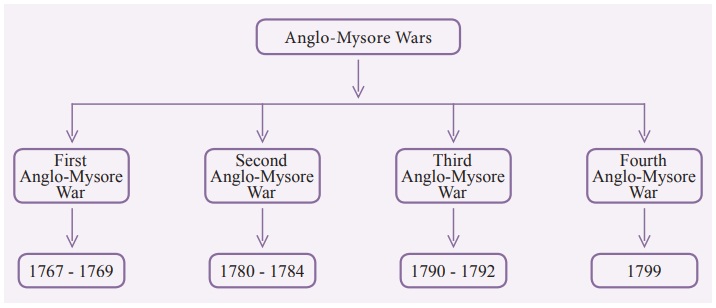From Trade to Territory | Chapter 2 | History | 8th Social Science - Mysore and its Resistance to British Expansion | 8th Social Science : History : Chapter 2 : From Trade to Territory
Chapter: 8th Social Science : History : Chapter 2 : From Trade to Territory
Mysore and its Resistance to British Expansion
Mysore and its Resistance to
British Expansion
The state of Mysore rose to
prominence in the politics of South India under the leadership of Haider Ali
(1760-82). He and his son Tipu Sultan (1782-99) played a prominent role against
the expansion of British Empire in India. Both of them faced the English with
undoubted courage. In 1761, he became the de facto ruler of Mysore. He also
proved to be the most formidable enemy of the English in India.

The First Anglo-Mysore
War (1767 - 69)
Causes
* Haider Ali’s growing power and his
friendly relations with the French became a matter of concern for the English
East India Company.
* The Marathas, the Nizam and the
English entered into a triple alliance against Haider Ali.
Course
The Nizam, with the help of British
troops under General Joseph Smith, invaded Mysore in 1767. Haider Ali defeated
English and captured Mangalore. In March 1769, he attacked Madras and forced
the English to sign a treaty on 4 April 1769.
Treaty of Madras (1769)
At the end of the war, the Treaty of Madras was signed between Haider Ali and British East India Company. Both the parties returned the conquered territories and promised to help each other in case of any foreign attack on them.
The Second
Anglo-Mysore War (1780-84)
Causes
* The English did not fulfill the
terms of the treaty of 1769, when Haider’s territories were attacked in 1771 by
Marathas, Haider did not get help from the British.
* British captured Mahe, a French
settlement within Haider’s Jurisdiction. It led to the formation of an alliance
by Haider with the Nizam and Marathas against the English in 1779.
Course
In 1781, the British General Sir
Eyre Coote defeated Haider Ali at Porto Novo. The Mysore forces suffered
another defeat at Solinger. Haider Ali died of cancer during the course of the
war. After the death of Haider Ali in 1782, his son Tipu Sultan, continued the
war against the English.
Tipu captured Brigadier Mathews, the
supreme commander of the British forces along with his soldiers in 1783. It was
a serious loss to Tipu.
Treaty of Mangalore (1784)
On 7th March 1784 the treaty of
Mangalore was signed between the two parties. Both agreed to return the
conquered territories and also the prisoners of war.
Thus, Warren Hastings saved the
newly-established British dominion from the wrath of powerful enemies like
Marathas and Haider Ali. When the British lost their colonies in America and
elsewhere, Warren Hastings lost nothing in India. Instead, he consolidated the
British power in India.
The Third Anglo-Mysore
War (1790-92)
Causes
* Tipu was trying to seek alliance
of foreign powers against the English and for that purpose he had sent his
ambassadors to France and Turkey.
* Tipu attacked on Travancore in
1789 whose ruler was an ally of the British.
* The English, the Nizam and the
Marathas entered into a “Triple Alliance” against Mysore.
Course
Tipu fought alone which continued
for two years. It was fought in three phases. The attack of the English under
General Medows failed. Therefore, in December 1790, Cornwallis himself took the
command of the army. Cornwallis captured all the hill-forts which obstructed
his advance towards Srirangapatam and reached near its outer wall. Tipu felt
desperate and opened negotiations with the English. Cornwallis agreed and the
treaty of Srirangapatnam was concluded in 1792.
Treaty of Srirangapatnam (1792)
* Tipu surrendered half of his
kingdom to the allies.
* Tipu agreed to pay 3.6 crore of
rupees to the English as war indemnity and surrendered two of his sons as
hostages to the English.
* The English acquired Malabar,
Coorg, Dindigul and Baramahal(Coimbatore and Salem).
The Fourth
Anglo-Mysore War (1799)
Tipu Sultan did not forget the
humiliating treaty of Srirangapatnam imposed upon him by Cornwallis in 1790.
Causes
* Tipu sought alliance with foreign
powers against the English and sent ambassadors to Arabia, Turkey, Afghanistan
and the French.
* Tipu was in correspondence with
Napoleon who invaded Egypt at that time.
* The French officers came to
Srirangapatnam where they founded a Jacobin Club and planted the Tree of
Liberty.
Course
Wellesley declared war against Tipu
in 1799. The war was short and decisive. As planned, the Bombay army under
General Stuart invaded Mysore from the west. The Madras army, which was led by
the Governor-General’s brother, Arthur Wellesley, forced Tipu to retreat to his
capital Srirangapatnam. On 4th May 1799 Srirangapatnam was captured. Tipu
fought bravely and was killed finally. Thus ended the fourth Mysore War and the
whole of Mysore lay prostrate before the British.
Mysore after the War
*
The English occupied Kanara, Wynad, Coimbatore, Darapuram and Srirangapattinam.
* Krishna Raja Odayar of the former
Hindu royal family was brought to the throne.
* Tipu’s family was sent to the fort
of Vellore.
Related Topics